By Mabinty M. Kamara
The Institute for Governance Reform’s latest Parliamentary Tracker has indicated that 40% of Parliamentarians in the last parliament did not participate in any debate.
“40 MPs spoke only one or two times in all 277 sittings or did not speak at all,” the report reads in part.
The report provides an analysis of the performance of 146 MPs from 2018 to 2023 in the area of attendance, oversight, and scrutiny of the executive. According to the report, the Fifth Parliament held 277 (two hundred and seventy-seven) sittings in the last five years.
“This means, that between 2018 and 2023, each MP had 277 sessions to represent his/her constituents, contribute to debates, and hold the executive to account,” it reads in part.
However, the report indicated that 74 MPs did not attend 40% of the 277 sessions, pointing out the highest attendees; William L Joseph (78%); Bai Sama Kamara (76%), and Nenneh Lebbie (75%).
Quoting the 2020 Afrobarometer report, the report stated that, the majority of Sierra Leoneans think MPs were “not very effective” or “not at all effective” at listening to their constituents and representing their needs in Parliament (75%); or are doing a poor job of holding the president and government accountable (48%); and making laws for the good of the country (49%). While almost eight in 10 citizens (78%) want MPs to visit their constituencies at least once a year, only half as many (40%) say MPs do so.
The report indicated that public trust became lowest towards the end of the life of the parliament. “By July 2022, only 34% of citizens said they trusted their MPs a lot or somewhat (Afrobarometer 2022). The highest driver of mistrust was citizens’ perceptions of corruption. Parliament (49%) ranked high, second only to the police (79%) among institutions whose members were perceived to be most or all corrupt,” it stated.
The report also highlighted that Sierra Leoneans had major concerns about oversight and scrutiny of executive spending and accountability. It noted that less than 35% of recommendations of the Auditor General’s report were implemented or enforced by the 33 Committees of parliament; quoting ‘IGR – Audit Tears’ an earlier report by the institution.
These concerns notwithstanding, it stated that 52% of former MPs were re-elected under the District Block Proportional Representation system to the current parliament, “the highest retention rate since 2002.”
82% of MPs were retained in Bo district, and 80% in Pujehun the highest retention rates according to the report while Kambia and Kono had the lowest retention rates of 17% and 33% respectively.
The aim of tracking the last parliament1 according to the research institution, is to ensure that the current parliament is more effective in the execution their roles.
“This tracker therefore draws on data available on the Parliamentary website, as well as studies conducted by IGR, Afrobarometer, and other sources, to develop an index on the performance of former MPs,” it pointed out.
The 2022 Open Parliament Index 3 ranked Sierra Leone among the three highest performers on transparency and public accountability in West Africa. However, poor attendance at sessions and oversight meetings was a major concern.
The sixth parliament of the Republic of Sierra Leone on Thursday 13th July resumed with the 96 newly elected and paramount chief Members of Parliament taking the oath of office and the reelection of the speaker of the House Dr. Abass Bundu. Only two political parties made it to this parliament; the main opposition All People’s Congress (APC) and the ruling Sierra Leone Peoples Party. However, the APC boycotted their participation in parliament and the local councils in protest over the outcome of the General Elections, citing electoral irregularities. However, Parliamentarian Mohamed Bangura of the APC refused to go by his party’s stance and instead took oath and began attending sittings.
Copyright © 2023 Politico Online








